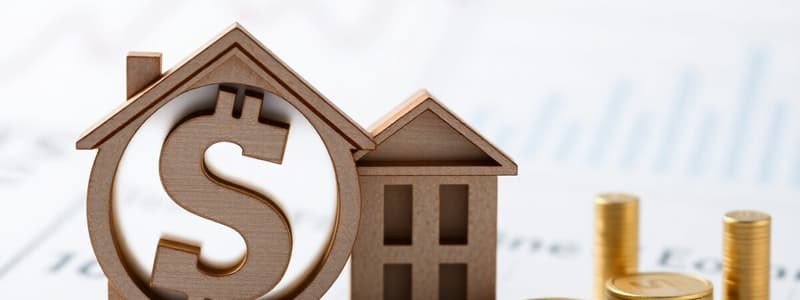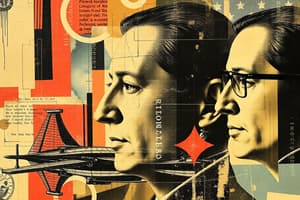Podcast
Questions and Answers
The core focus of economics is the study of wealth distribution, rather than the analysis of choices made with scarce resources.
The core focus of economics is the study of wealth distribution, rather than the analysis of choices made with scarce resources.
False (B)
Economic agents, such as households and firms, always operate with complete information when making decisions.
Economic agents, such as households and firms, always operate with complete information when making decisions.
False (B)
Positive economics involves subjective value judgments to recommend what economic agents should do.
Positive economics involves subjective value judgments to recommend what economic agents should do.
False (B)
Normative economics can be used to determine the effectiveness of public policies designed to reduce the gender pay gap.
Normative economics can be used to determine the effectiveness of public policies designed to reduce the gender pay gap.
Microeconomics focuses on the aggregate economic performance of a country, such as GDP and unemployment rates.
Microeconomics focuses on the aggregate economic performance of a country, such as GDP and unemployment rates.
Macroeconomics examines consumer choice and the competitive behavior of firms, isolating individual components of the economy.
Macroeconomics examines consumer choice and the competitive behavior of firms, isolating individual components of the economy.
Analyzing the effect of a recent labor market reform on a country's GDP is considered a macroeconomic inquiry.
Analyzing the effect of a recent labor market reform on a country's GDP is considered a macroeconomic inquiry.
Optimization in economics assumes that agents always make the absolute best choice without constraints.
Optimization in economics assumes that agents always make the absolute best choice without constraints.
Changing available information at the time of decision-making will never alter the optimal final choice.
Changing available information at the time of decision-making will never alter the optimal final choice.
A budget constraint forces individuals to make choices and face trade-offs
A budget constraint forces individuals to make choices and face trade-offs
Opportunity cost is defined as the monetary value of any alternative use of a resource, regardless of its relative merit.
Opportunity cost is defined as the monetary value of any alternative use of a resource, regardless of its relative merit.
In cost-benefit analysis, expressing all costs and benefits in a common unit of measurement is unnecessary as long as the decision-maker understands relative preferences.
In cost-benefit analysis, expressing all costs and benefits in a common unit of measurement is unnecessary as long as the decision-maker understands relative preferences.
A situation where nobody would benefit by changing their behavior describes a state of disequilibrium.
A situation where nobody would benefit by changing their behavior describes a state of disequilibrium.
The free-rider problem arises when an agent assumes all the costs of a choice while being excluded from its benefits.
The free-rider problem arises when an agent assumes all the costs of a choice while being excluded from its benefits.
Empiricism, as applied in economics, exclusively relies on theoretical models and disregards the use of real-world data for analysis.
Empiricism, as applied in economics, exclusively relies on theoretical models and disregards the use of real-world data for analysis.
Correlation between two events implies that one event directly causes the other, and no other explanation needs to be considered.
Correlation between two events implies that one event directly causes the other, and no other explanation needs to be considered.
In a controlled experiment, subjects are assigned to treatment and control groups based on pre-existing characteristics.
In a controlled experiment, subjects are assigned to treatment and control groups based on pre-existing characteristics.
A good economic question is one that is abstract and theoretical, with no clear connection to real-world social welfare.
A good economic question is one that is abstract and theoretical, with no clear connection to real-world social welfare.
In the equation of a line, $y = mx + n$, the variable 'm' represents the y-intercept and 'n' represents the slope.
In the equation of a line, $y = mx + n$, the variable 'm' represents the y-intercept and 'n' represents the slope.
Optimization in levels involves analyzing the change in net benefit between different options, rather than the total net benefit of each option.
Optimization in levels involves analyzing the change in net benefit between different options, rather than the total net benefit of each option.
Collecting complete information is always beneficial for optimization, regardless of the cost or complexity involved.
Collecting complete information is always beneficial for optimization, regardless of the cost or complexity involved.
Marginal cost is the total cost incurred from choosing one decision over another.
Marginal cost is the total cost incurred from choosing one decision over another.
When using optimization in differences you should choose the option that makes you worse off by moving towards it and better off by moving away from it.
When using optimization in differences you should choose the option that makes you worse off by moving towards it and better off by moving away from it.
Flashcards
Economics
Economics
The study of how agents make choices with scarce resources and the impact of these choices on society.
Economic Agent
Economic Agent
Any individual or group that makes choices, such as consumers, firms, or governments.
Scarce Resources
Scarce Resources
Goods for which there is not enough to satisfy everyone's wants.
Positive Economics
Positive Economics
Signup and view all the flashcards
Normative Economics
Normative Economics
Signup and view all the flashcards
Microeconomics
Microeconomics
Signup and view all the flashcards
Macroeconomics
Macroeconomics
Signup and view all the flashcards
Optimization
Optimization
Signup and view all the flashcards
Trade-offs
Trade-offs
Signup and view all the flashcards
Budget Constraint
Budget Constraint
Signup and view all the flashcards
Opportunity Cost
Opportunity Cost
Signup and view all the flashcards
Cost-Benefit Analysis
Cost-Benefit Analysis
Signup and view all the flashcards
Equilibrium
Equilibrium
Signup and view all the flashcards
Free-Rider Problem
Free-Rider Problem
Signup and view all the flashcards
Empiricism
Empiricism
Signup and view all the flashcards
Model
Model
Signup and view all the flashcards
Causation
Causation
Signup and view all the flashcards
Correlation
Correlation
Signup and view all the flashcards
Omitted Variables
Omitted Variables
Signup and view all the flashcards
Reverse Causality
Reverse Causality
Signup and view all the flashcards
Controlled Experiment
Controlled Experiment
Signup and view all the flashcards
Natural Experiment
Natural Experiment
Signup and view all the flashcards
Optimization in Differences
Optimization in Differences
Signup and view all the flashcards
Study Notes
- Economics studies agents' choices regarding scarce resources and how these choices impact society.
- Choice, not money, is central to economics.
Economic Agents and Scarce Resources
- Economic agents are individuals or groups making choices, such as consumers, firms, or governments.
- Scarce resources are insufficient to satisfy everyone’s wants.
Positive vs. Normative Economics
- Positive economics objectively describes what economic agents do, focusing on facts and how the economy works.
- Example: Analyzing the gender income gap in Spain and its determinants.
- Normative economics involves decision-makers determining what economic agents should do, incorporating subjective judgments.
- Example: Deciding whether to implement public policies to reduce the gender income gap and which policies would be most effective.
- Normative analysis often leads to public policies.
Microeconomics vs. Macroeconomics
- Microeconomics studies choices made by individuals, households, firms, and governments and their effects on prices and resource allocation.
- Focuses on specific components of the economy in isolation.
- Examples: Consumer choice, electricity market design.
- Macroeconomics studies the economy as a whole.
- Examines aggregate production, inflation, economic cycles, and monetary policy
- Examples: The effect of labor reform on unemployment and GDP.
First Principle: Optimization
- Optimization means making the best choice with the given information.
- Feasible options are those available to an agent.
- Preferences determine what constitutes the "best" choice for an agent.
- Trade-offs occur when choosing one thing means giving up something else.
- Budget constraints limit choices due to limited resources.
- Opportunity cost is the value of the next best alternative use of a resource, often expressed in monetary terms.
- Cost-benefit analysis compares the benefits and costs of each option in a common unit of measurement.
- Example: Considering the opportunity cost of spending time on social media apps like Instagram or TikTok and the best alternative use of that time.
Second Principle: Equilibrium
- Equilibrium is a situation where no one benefits by changing their behavior.
- Decisions are made optimally, considering the available information.
- Free-rider problem: An agent benefits from a choice without bearing all the costs.
- Example: A flatmate watches TV instead of cleaning dishes, benefiting without assuming the cleaning costs.
Third Principle: Empiricism
- Empiricism involves using data to answer questions.
- Correlation differs from causation; just because two things occur together does not mean one causes the other.
Is Studying Economics Beneficial?
- Benefit: Understanding how economic thinking applies to daily life.
- Cost: Tuition, stress, and opportunity cost.
The Scientific Method
- Specify a model as a simplified description of reality.
- Generate hypotheses or predictions about the real world based on the model.
- Test the model using data to assess how well it matches observations.
- Revise the model if it does not accurately explain the data.
- Models are simplifications, like a flat map of the Madrid metro.
- Working with data requires distinguishing between causation and correlation.
- Causation: One factor directly affects another.
- Correlation:
- Positive: Factors change in the same direction.
- Negative: Factors change in opposite directions.
- Omitted variables and reverse causality can lead to misinterpretations of correlation.
- Omitted variables: Ignoring a contributing factor to the cause and effect. Resulting in a misleading correlation.
- Reverse causality: Confusing the direction of cause and effect.
- Experiments can be:
- Controlled where researchers randomly assign subjects to treatment and control groups.
- Natural where subjects end up in treatment or control groups due to events not controlled by the researcher.
- The usefulness of a scientific model depends on its ability to be tested using data.
- Good economic questions should be relevant, important, and empirically answerable.
- Graphs can visually summarize numeric information and represent models.
- Equation of a line: y = mx + n, where m is the slope, and n is the y-intercept.
Optimization
- Optimization in levels: Calculate total benefit minus total cost (net benefit).
- Optimization in differences: Examine the change in net benefit between options.
- Limits to optimization include:
- Limited information.
- Costly information gathering.
- Lack of Experience
- Trade-offs.
- Factors to consider for commuting costs when choosing an apartment:
- Public transportation availability.
- Gasoline costs.
- Parking fees.
- Vehicle wear and tear.
- Opportunity cost of time.
Optimization Process
- Express all costs and benefits in the same unit.
- Calculate the total net benefit for each option (benefits - costs).
- Select the option with the highest net benefit.
- Marginal cost is the additional cost incurred when choosing one more of something.
Studying That Suits You
Use AI to generate personalized quizzes and flashcards to suit your learning preferences.



